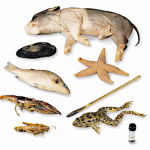Zoology
|
7 october 2015 19:18:26 |
| Assessing the adequacy of essential nutrient intake in obese dogs undergoing energy restriction for weight loss: a cohort study (BMC Veterinary Research) |
|
Tweet Background:
Canine obesity is usually treated with dietary energy restriction, but data are limited regarding nutritional adequacy. The aim of the current study was to compare intake of essential nutrients with National Research Council recommendations in obese dogs during weight management with a purpose-formulated diet.
Methods:
Twenty-seven dogs were included in this non-randomised retrospective observational cohort study. All were determined to be systemically well, and without significant abnormalities based upon physical examination and clinicopathological assessments. The dogs underwent a controlled weight loss protocol of at least 182 days’ duration using a high protein high fibre weight loss diet. Median, maximum, and minimum daily intakes of all essential nutrients were compared against NRC 2006 recommended allowances (RA) for adult dogs.
Results:
Median weight loss was 28 % (16–40 %), mean daily energy intake was 61 kcal/kg
0.75
(44–74 kcal/kg
0.75
), and no clinical signs of nutrient deficiency were observed in any dog. Based upon the average nutrient content of the diet, daily intake of the majority of essential nutrients was greater than their NRC 2006 recommended allowance (RA per kg body weight
0.75
), except for selenium, choline, methionine/cysteine, tryptophan, magnesium, and potassium. However, apart from choline (2/27 dogs) and methionine/cysteine (2/27 dogs), all essential nutrients remained above NRC minimum requirements (MR) throughout the trial.
Conclusions:
When fed the diet used in the current study, daily intakes of most essential nutrients meet both their NRC 2006 RA and MR in obese dogs during weight loss. In light of absence of clinical signs of nutrient deficiency, it is unclear what significance intakes less that NRC cut-offs for some nutrients have (especially selenium and choline), and further studies are recommended. |
| 93 viewsCategory: Medicine, Zoology |
 Prospective study of the primary evaluation of 1016 horses with clinical signs of abdominal pain by veterinary practitioners, and the differentiation of critical and non-critical cases (Acta Veterinaria Scandinavica) Prospective study of the primary evaluation of 1016 horses with clinical signs of abdominal pain by veterinary practitioners, and the differentiation of critical and non-critical cases (Acta Veterinaria Scandinavica)Longitudinal study of Clostridium difficile shedding in raccoons on swine farms and conservation areas in Ontario, Canada (BMC Veterinary Research) 
|
| blog comments powered by Disqus |
MyJournals.org
The latest issues of all your favorite science journals on one page
The latest issues of all your favorite science journals on one page



